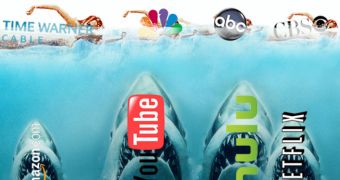According to a new poll, it would appear that the Internet has finally moved ahead of the television set as the main source of information for young adults. TV still leads the way for adults and seniors, but the Internet is making considerable headway in these subgroups as well.
The investigation that arrived at this conclusion was conducted by experts at the Pew Research Center, who focused their attention on young adults aged 18 to 29.
This segment of the population uses the Internet as the main national and international news source, in a much larger share than television. About 52 percent of people below 30 named TV as their main news source, a considerable drop from 68 percent in 2007.
The Internet was the main source of new data for 65 percent of those below the age of 30, a sharp rise from 34 percent just three years ago. Some 1,500 American adults were included in the new study, alongside seniors and young adults.
In the adult age range, TV dropped in preferences from 74 to 66 percent, while the Internet climbed from 17 to 41 percent. The data indicate that the WWW is rising in preferences even for adults.
An interesting finding was made in the 51-64 age group, where the Internet is in par with newspaper in people's preferences (roughly 34 to 38 percent). The TV is still the main news source for this age group, holding steady at 71 percent.
The new study echoes a growing demand, especially for adults and young adults, to have access to the most relevant and varied news sources. The traditional view on the news, in what people listen to what a news anchor is telling them and believe it to be the truth, has long since disappeared.
People now much prefer to get their news from a variety of sources, and then compare all viewpoints to derive a personal view of what happened. TV stations are known for putting their angle, or that of their owners, on all stories.
A good example is Fox, a network whose reporters been asked by company executives to present global warming as if the phenomenon is still debatable. This was done at the December 2010 Cancun UN Climate Summit, held in Mexico.
Fox lost a lot of its credibility when the news of the internal memo leaked, because it basically showed how it lied to its audiences. In all books, this is called manipulating the public opinion, and people are beginning to become aware and sickened of it.
This is why the Internet is becoming so popular. Other angles of the same news are always a few clicks away, and people can find sources that are not corrupted by political interests, Daily Galaxy reports.

 14 DAY TRIAL //
14 DAY TRIAL //